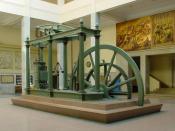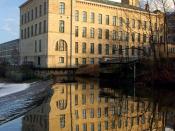Emergence of Europe
The European Industrial Revolution was a time of drastic change. In England it became a transformation from hand tools and hand made items to machined and mass-produced goods. The growth of factories replaced the cottage industries and spawned the development of cities. Growing cities and factories led to changes in transportation, labor, and working conditions. These changes generally helped workers lives, even though initially there were more negatives than positives.
European imperialism, the domination by one country of the political, economic or cultural life of another country or region, was at its peak between 1850 and 1914. This was due to several different economic and political forces that enabled strong nations to control less developed and weaker nations. The Industrial Revolution was a major role in the new imperialism in Europe along with many technological advances. Europe became a leading power in political and economical affairs.
Before the Industrial Revolution England's economy was based on its cottage industry. Workers would buy raw materials from merchants, take it back to their cottages, hence the name, and produce the goods at their homes. This industry was efficient but the workers productivity was low. Goods were high in price and exclusive to only wealthy people. The Industrial Revolution meant factories could mass-produce items at much lower costs than the cottage industries, making goods more affordable to consumers.
With the invention of the steam engine, a shift from rural waterwheels to steam engines as an industrial power source facilitated the emergence of factories and industrial cities. Factories started the process of urbanization by causing people to leave rural sectors and move to the cities looking for a better life. The increase in population in the cities caused overcrowding, pollution, and thus became a breeding ground for communicable diseases. Cities...


